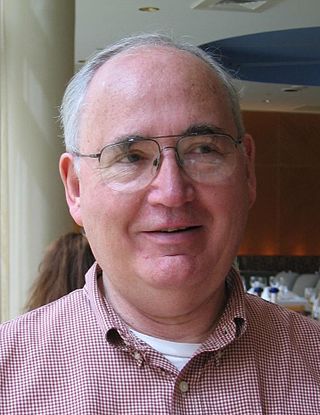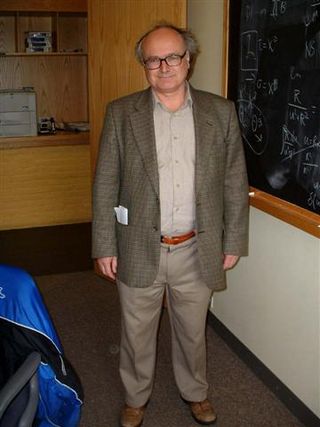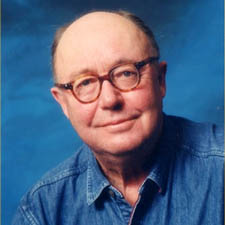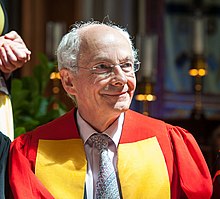
Dana Stewart Scott is an American logician who is the emeritus Hillman University Professor of Computer Science, Philosophy, and Mathematical Logic at Carnegie Mellon University; he is now retired and lives in Berkeley, California. His work on automata theory earned him the Turing Award in 1976, while his collaborative work with Christopher Strachey in the 1970s laid the foundations of modern approaches to the semantics of programming languages. He has worked also on modal logic, topology, and category theory.

The School of Informatics is an academic unit of the University of Edinburgh, in Scotland, responsible for research, teaching, outreach and commercialisation in informatics. It was created in 1998 from the former department of artificial intelligence, the Centre for Cognitive Science and the department of computer science, along with the Artificial Intelligence Applications Institute (AIAI) and the Human Communication Research Centre.
Categorical logic is the branch of mathematics in which tools and concepts from category theory are applied to the study of mathematical logic. It is also notable for its connections to theoretical computer science. In broad terms, categorical logic represents both syntax and semantics by a category, and an interpretation by a functor. The categorical framework provides a rich conceptual background for logical and type-theoretic constructions. The subject has been recognisable in these terms since around 1970.

Gary William Gibbons is a British theoretical physicist.

Gordon David Plotkin, is a theoretical computer scientist in the School of Informatics at the University of Edinburgh. Plotkin is probably best known for his introduction of structural operational semantics (SOS) and his work on denotational semantics. In particular, his notes on A Structural Approach to Operational Semantics were very influential. He has contributed to many other areas of computer science.
Robin Oliver Gandy was a British mathematician and logician. He was a friend, student, and associate of Alan Turing, having been supervised by Turing during his PhD at the University of Cambridge, where they worked together.
Richard Jozsa is an Australian mathematician who holds the Leigh Trapnell Chair in Quantum Physics at the University of Cambridge. He is a fellow of King's College, Cambridge, where his research investigates quantum information science. A pioneer of his field, he is the co-author of the Deutsch–Jozsa algorithm and one of the co-inventors of quantum teleportation.
Hugh Christopher Longuet-Higgins was a British scholar and teacher. He was the Professor of Theoretical Chemistry at the University of Cambridge for 13 years until 1967 when he moved to the University of Edinburgh to work in the developing field of cognitive science. He made many significant contributions to our understanding of molecular science. He was also a gifted amateur musician, both as performer and composer, and was keen to advance the scientific understanding of this art. He was the founding editor of the journal Molecular Physics.

Steve Vickers is a British mathematician and computer scientist. In the early 1980s, he wrote ROM firmware and manuals for three home computers, the ZX81, ZX Spectrum, and Jupiter Ace. The latter was produced by Jupiter Cantab, a short-lived company Vickers formed together with Richard Altwasser, after the two had left Sinclair Research. Since the late 1980s, Vickers has been an academic in the field of geometric logic, writing over 30 papers in scholarly journals on mathematical aspects of computer science. His book Topology via Logic has been influential over a range of fields. In October 2018, he retired as senior lecturer at the University of Birmingham. As announced on his university homepage, he continues to supervise PhD students at the university and focus on his research.

Christopher Michael Bishop is a British computer scientist. He is a Microsoft Technical Fellow and Director of Microsoft Research AI4Science. He is also Honorary Professor of Computer Science at the University of Edinburgh, and a Fellow of Darwin College, Cambridge. Chris was a founding member of the UK AI Council, and in 2019 he was appointed to the Prime Minister’s Council for Science and Technology.

Nina Claire Snaith is a British mathematician at the University of Bristol working in random matrix theory and quantum chaos.
Ursula Hilda Mary Martin is a British computer scientist, with research interests in theoretical computer science and formal methods. She is also known for her activities aimed at encouraging women in the fields of computing and mathematics. Since 2019, she has served as a professor at the School of Informatics, University of Edinburgh.
Dialectica spaces are a categorical way of constructing models of linear logic.

Roger Michael Needham was a British computer scientist.
Vlatko Vedral is a Serbian-born physicist and Professor in the Department of Physics at the University of Oxford and a Fellow of Wolfson College, Oxford. Until the summer of 2022 he also held a joint appointment at the Centre for Quantum Technologies (CQT) at the National University of Singapore. He is known for his research on the theory of quantum entanglement and quantum information theory. He has published numerous research papers, which are regularly cited, in quantum mechanics and quantum information, and was awarded the Royal Society Wolfson Research Merit Award in 2007. He has held a lectureship and readership at Imperial College, a professorship at Leeds and visiting professorships in Vienna, Singapore (NUS) and at the Perimeter Institute for Theoretical Physics in Canada. He is the author of several books, including Decoding Reality.
Davide Sangiorgi is an Italian professor of computer science at the University of Bologna. He has previously held research positions at the University of Edinburgh and at Inria. He has received his PhD from the University of Edinburgh under the supervision of Robin Milner in 1993. He has had visiting positions at Centrum Wiskunde & Informatica, University of Cambridge, University of Oxford.

Valeria Correa Vaz de Paiva is a Brazilian mathematician, logician, and computer scientist. Her work includes research on logical approaches to computation, especially using category theory, knowledge representation and natural language semantics, and functional programming with a focus on foundations and type theories.

Eugenia Loh-Gene Cheng is a British mathematician, educator and concert pianist. Her mathematical interests include higher category theory, and as a pianist she specialises in lieder and art song. She is also known for explaining mathematics to non-mathematicians to combat math phobia, often using analogies with food and baking. Cheng is a scientist-in-residence at the School of the Art Institute of Chicago.
E-Theses Online Service (EThOS) is a bibliographic database and union catalogue of electronic theses provided by the British Library, the National Library of the United Kingdom. As of February 2022 EThOS provides access to over 500,000 doctoral theses awarded by over 140 UK higher education institutions, with around 3000 new thesis records added every month.
Alexandra Lascarides is a linguist and chair in Semantics in the School of Informatics at the University of Edinburgh. Her research investigates computational linguistics and artificial intelligence.










